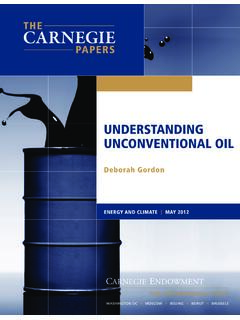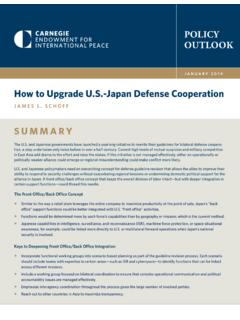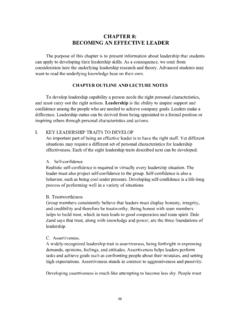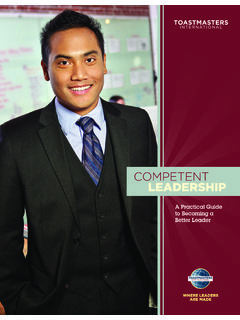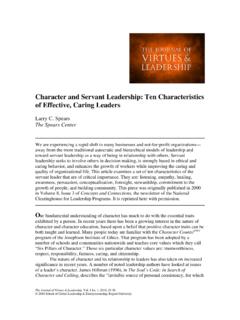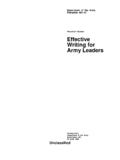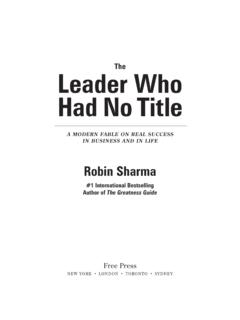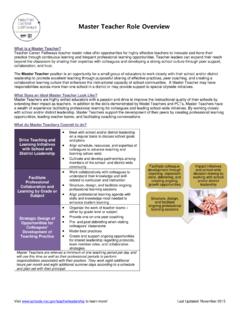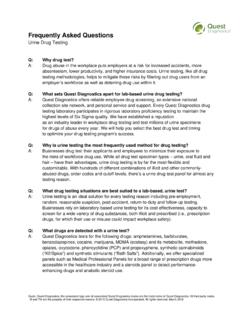Transcription of Reading Khamenei: The World View of Iran's Most Powerful ...
1 RD. O. W. RE. FO. EW. N. Reading . KHAMENEI: THE World VIEW. OF Iran's MOST. Powerful LEADER. BY KARIM SADJADPOUR. Reading Khamenei: The World View of Iran's Most Powerful Leader Karim Sadjadpour 2009 Carnegie Endowment for International Peace. All rights reserved. No part of this publication may be reproduced or transmitted in any form or by any means without permission in writing from the Carnegie Endowment. The Carnegie Endowment normally does not take institutional positions on public policy issues; the views represented here do not necessarily reflect the views of the Endowment, its staff, or its trustees.
2 For electronic copies of this report, visit Carnegie Endowment for International Peace 1779 Massachusetts Avenue, NW. Washington, DC 20036. Phone: 202-483-7600. Fax: 202-483-1840. Cover design by Design Army Composition by Oakland Street Publishing ii Contents Acknowledgments iv Foreword v The Importance of Khamenei 1. Humble Beginnings to Great Power 4. becoming Supreme Leader 6. The Virtues of the Revolution 9. Revolutionary Virtues and Foreign Policy 14. Challenges to His Leadership and Iran's Post-Khamenei Future 27. Conclusions and Policy Implications 30. Notes 32. About the Author 34.
3 Carnegie Endowment for International Peace 35. iii Acknowledgments T he author wishes to thank Thomas Carothers, Afshin Molavi, Mohsen Milani, Mila Mincy, Marina Ottaway, Ilonka Oszvald, George Perkovich, Peter Reid, and Shangol Shahriari for their most helpful comments. Special thanks are in order to three highly tal- ented Carnegie junior fellows Mike Grosack, Andrew Ng, and Zach Davis whose research and editorial contributions were indispensable. iv Foreword A mong the numerous casualties of Iran's tainted 2009 presidential elections was the legitimacy of Supreme Leader Ayatollah Ali Khamenei.
4 While for two decades Khamenei had attempted to cultivate an image of an impartial and magnanimous guide staying above the political fray, his defiant public support for hardline President Mahmoud Ahmadinejad amid massive popular uprisings and unprecedented fissures among the coun- try's political elites exposed him as a petty, partisan autocrat. At a popular level, previously sacred taboos were shattered as hundreds of thousands of Iranians defied Khamenei's unveiled threats against protesters by taking to the streets chant- ing death to the dictator and even death to Khamenei. Widely seen images of govern- ment-sanctioned brutality against civilians such as the horrific murder of 27-year-old Neda agha Soltan as well as persistent allegations of torture, rape, and forced confessions in prison have undermined Khamenei's image as a just spiritual leader among Iran's pious classes.
5 Widespread allegations of the growing role of his son Mojtaba considered a key Ahmadinejad ally in Iran's repressive security apparatus have further tarnished Khamenei's public image. At a political level, once respectful subordinates including reformist leaders Mohammed Khatami, Mehdi Karroubi, and Mir Hossein Mousavi now openly defy Khamenei, refusing to renounce claims of electoral fraud and brutality. Previously restrained critics have turned vociferous. Grand Ayatollah Montazeri, Iran's most senior cleric (currently under house arrest) and once the heir apparent to Ayatollah Khomeini, denounced Khamenei as an unqualified and illegitimate leader.
6 Abdul Karim Soroush, Iran's most prominent religious intellectual (currently in exile), lambasted Khamenei as a cheating, treacherous murderer cursed with doom. Unprecedented dissent even came from within the Assembly of Experts, the 86-cleric body headed by Khamenei rival Hashemi Rafsanjani that has the constitutional authority to anoint and remove the Supreme Leader. Despite the damage to his reputation, Khamenei's vast and potent network remains for the moment intact. The country's most Powerful institutions the Revolutionary Guards, presidency, Parliament, Guardian Council, and judiciary continue to be led by individu- als either directly appointed by Khamenei or deeply loyal to him.
7 Khamenei also retains enormous influence over the Iranian economy. He has more say than anyone over how the country's vast oil revenue (nearly $300 billion during Ahmadinejad's first term) is spent and has jurisdiction over the country's bonyads state-controlled religious foundations with bil- lions of dollars in assets in addition to the millions more his office receives in charitable donations offered to Iran's holy shrines. Given his deep mistrust of both foreign powers and his own population, Khamenei, despite his clerical garb, has grown to rely on the support of the intelligence, security, and military apparatus far more than the clergy.
8 As commander in chief of the Revolutionary Guards, he handpicks the organization's senior command and shuffles them regularly; he also oversaw the Guards' rapid rise to become Iran's most Powerful political and economic institution. v With the seemingly firm support of the country's security apparatus, Khamenei has refused to cede any political ground since the election, long believing that compromise projects weakness and invites further pressure. His defiance is not cost free, however. For the last two decades, his modus operandi had been to wield power without accountability. Despite having the lion's share of Iran's constitutional authority, because of the high profile of the Iranian president both at home and abroad, Khamenei has never borne proper responsibility for Iran's economic malaise, political repression, and social restrictions.
9 After the June elections, however, Khamenei no longer enjoys this immunity. In addition to his domestic travails, Khamenei is facing unprecedented international scrutiny. In the conclusion of this paper, I suggested that after three decades of immersion in the death to America culture of 1979, it may not be possible for Khamenei to reinvent himself at age 70. Even one former Iranian president once confided that Khamenei had told him that Iran needs enmity with the United States. Nonetheless, if engagement is to have any chance of success, I argued, Washington must take into account Khamenei's central role in Iran's decision-making process and his deeply held sus- picions.
10 Beginning with his inauguration speech on January 21, 2009, Barack Obama has fol- lowed this path more than any previous American president. In addition to numerous rhetorical overtures to the Islamic Republic of Iran the first president to acknowledge Iran's post-revolutionary name Obama sent two private letters to Khamenei reiterating Washington's desire to overcome past mistrust and build confidence with Tehran. Obama also trod carefully during Iran's post-election uprising, resisting calls to sup- port the opposition. Yet Khamenei's responses to overtures have been at best noncommittal, if not downright cynical.





